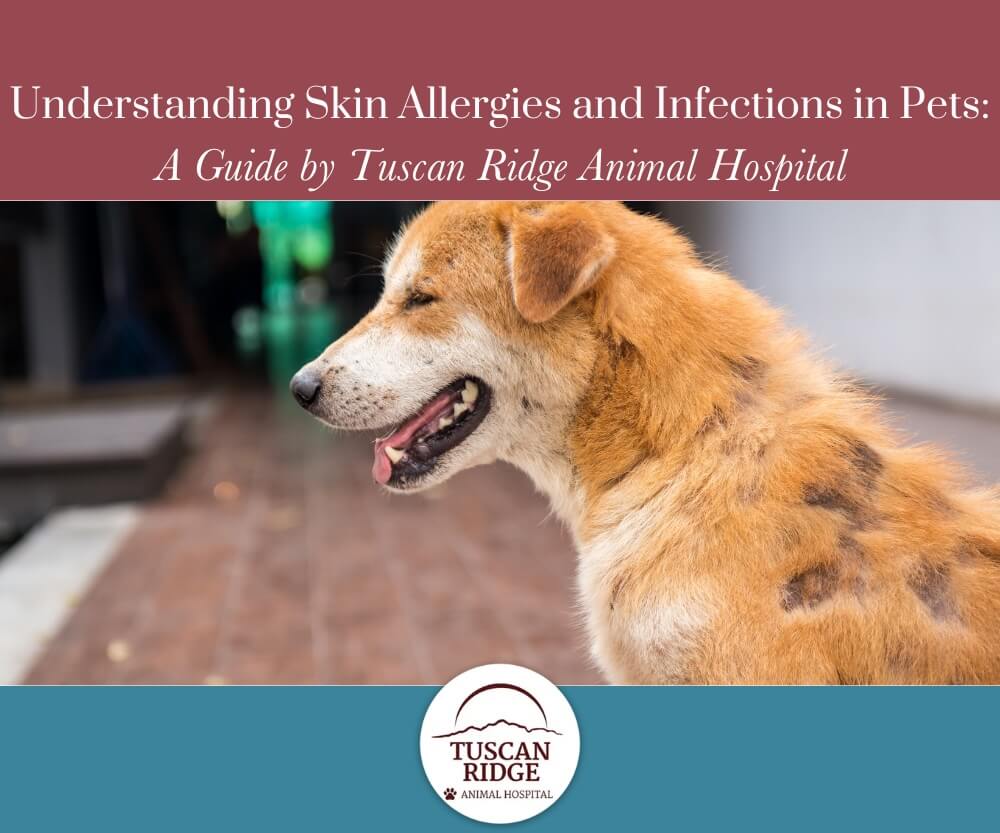 At Tuscan Ridge Animal Hospital, we are dedicated to the health and well-being of your pets. One common issue that many pets face is skin allergies and infections. These conditions can cause significant discomfort and health problems if left untreated.
At Tuscan Ridge Animal Hospital, we are dedicated to the health and well-being of your pets. One common issue that many pets face is skin allergies and infections. These conditions can cause significant discomfort and health problems if left untreated.
In this blog post, we will explore the causes, symptoms, and treatments of skin allergies and infections in pets. Additionally, we will provide a comprehensive Q&A section to address common concerns and questions pet owners may have.
What Are Skin Allergies and Infections?
Skin allergies in pets are reactions of the immune system to various environmental allergens such as pollen, dust mites, mold, certain foods, and flea saliva. These reactions can lead to intense itching, licking, redness, and irritation. Skin infections often occur as a secondary issue when the skin is compromised due to scratching, licking or biting which allows bacteria, fungi, or yeast to invade.
Common Causes of Skin Allergies
- Environmental Allergens: Pollen, dust mites, mold, and grasses can cause allergic reactions in pets, similar to hay fever in humans.
- Food Allergies: Certain ingredients in pet food, such as beef, chicken or dairy, can trigger allergic reactions.
- Flea Allergy Dermatitis: A single flea bite can cause severe itching and discomfort if a pet is allergic to flea saliva.
- Contact Allergens: Substances like shampoos, soaps, or certain fabrics can cause allergic reactions when they come into contact with the pet’s skin.
Symptoms of Skin Allergies and Infections
- Persistent itching, licking and scratching
- Red, inflamed skin
- Hair loss
- Scabs or crusts on the skin
- Hot spots (localized areas of intense itching and infection)
- Ear infections
- Generalized malodor
Diagnosis and Treatment
At Tuscan Ridge Animal Hospital, we begin with a thorough examination of your pet’s skin and a detailed medical history. Diagnostic tests such as skin and ear cytology, skin scraping and fungal culture may be conducted to identify the underlying cause.
Treatment typically involves:
- Medications: Antihistamines, corticosteroids, or antibiotics may be prescribed to control itching and treat infections.
- Special Shampoos and Topical Treatments: Medicated baths and topical treatments can help soothe the skin and reduce inflammation.
- Dietary Changes: Hypoallergenic diets or elimination diets may be recommended if food allergies are suspected.
- Flea Control: Effective flea prevention is crucial to manage flea allergy dermatitis.
Q&A Section
Q1: How can I tell if my pet has a skin allergy or just dry skin?
A1: While dry skin can cause itching, it usually doesn’t lead to the same level of discomfort and secondary symptoms (like hot spots) seen with allergies. Skin allergies often result in persistent itching, licking, redness, and inflammation, which are less common in simple dry skin cases. If your pet is showing signs of severe itching and skin irritation, it’s best to consult with a veterinarian.
Q2: Are certain breeds more prone to skin allergies?
A2: Yes, certain breeds are more susceptible to skin allergies. Breeds such as Golden Retrievers, Bulldogs, and Terriers are known to have a higher incidence of skin allergies. However, any breed can develop skin allergies.
Q3: Can skin allergies in pets be cured?
A3: Skin allergies in pets cannot be cured, but they can be effectively managed with proper treatment and care. The goal is to minimize symptoms and improve the pet’s quality of life through a combination of medical treatments, dietary changes, and environmental controls.
Q4: What can I do at home to help manage my pet’s skin allergies?
A4: At home, you can help manage your pet’s skin allergies by keeping their environment clean, using hypoallergenic shampoos, providing a balanced diet, and year round flea control. Regular grooming and bathing can also help remove allergens from the coat and skin.
Q5: How often should I bring my pet to the vet for skin allergies?
A5: The frequency of vet visits will depend on the severity of your pet’s condition. Initially, more frequent visits may be necessary to establish an effective treatment plan. Once the condition is under control, regular check-ups every 6-12 months are typically sufficient unless there are flare-ups.
Q6: Are there natural remedies that can help with my pet’s skin allergies?
A6: Some natural remedies, such as omega-3 fatty acids, probiotics, and oatmeal baths, may help soothe your pet’s skin and reduce inflammation. However, it’s important to consult with a veterinarian before starting any natural treatments to ensure they are safe and appropriate for your pet.
Q7: What are the signs that my pet’s skin infection is getting worse?
A7: Signs that a skin infection is worsening include increased redness and swelling, more frequent or severe scratching/licking, the appearance of pus or discharge, foul odor from the affected area, and changes in behavior such as lethargy or loss of appetite. If you notice any of these signs, contact your veterinarian immediately.
Q8: Can skin allergies lead to other health problems?
A8: Yes, if left untreated, skin allergies can lead to secondary infections, chronic skin conditions, and overall poor health. Persistent itching and discomfort can also affect a pet’s quality of life, leading to stress and behavioral issues.
At Tuscan Ridge Animal Hospital, we are committed to helping your pets lead healthy, comfortable lives. If you suspect your pet has a skin allergy or infection, don’t hesitate to contact us for an appointment. Our experienced team is here to provide comprehensive care and effective treatment options tailored to your pet’s needs.
For more information or to schedule an appointment, please visit our website or call us at (919) 556-1944. Let’s work together to keep your pets happy and healthy!
